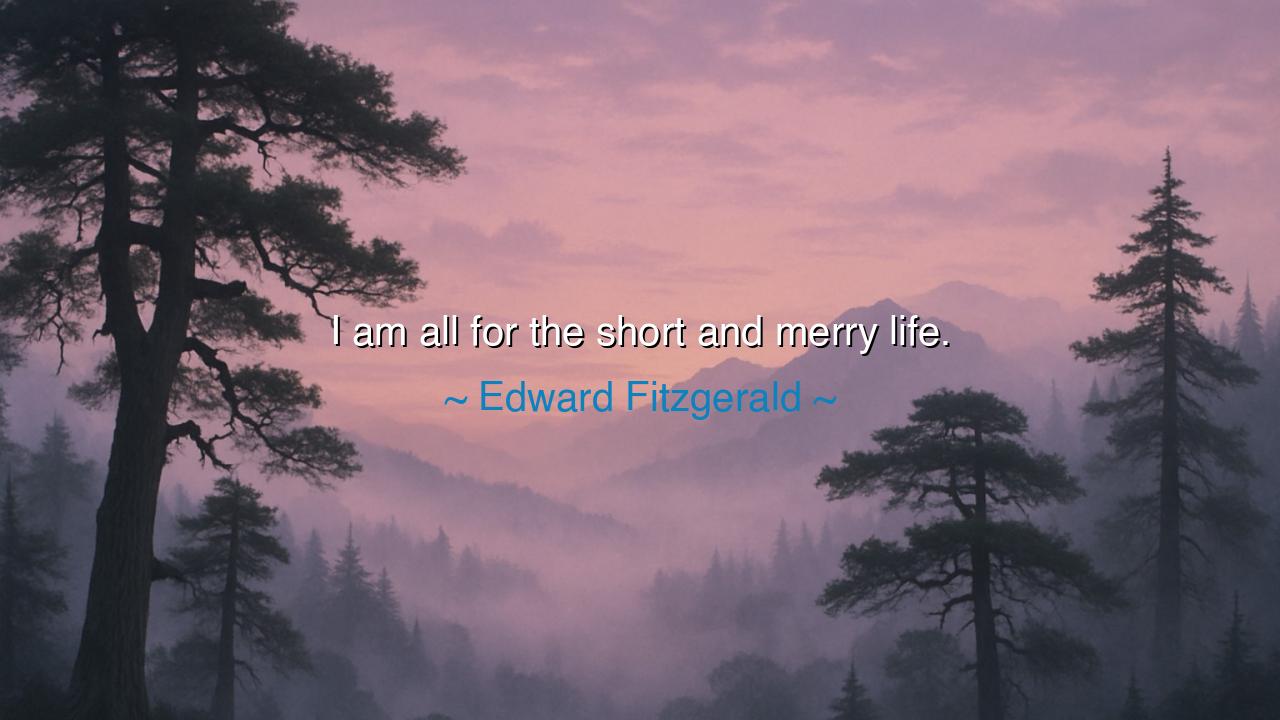
I am all for the short and merry life.






"I am all for the short and merry life." These words from Edward Fitzgerald capture the essence of a life lived with joy, spontaneity, and purpose. In an age that often prioritizes longevity over quality, Fitzgerald advocates for a life that is not defined by length but by the vividness and depth of the moments within it. To him, the true value of life lies not in the accumulation of years, but in how fully and joyfully those years are lived. This philosophy echoes the timeless wisdom of the ancients, who understood that the brevity of life does not diminish its worth, but rather calls for a more intense and meaningful engagement with the world.
In the teachings of the Greeks, the idea of living a "short and merry life" resonates with the philosophy of Epicurus, who posited that the goal of life is not length but pleasure—pleasure in the form of friendship, wisdom, and the absence of pain. Epicurus taught that true happiness comes from living in harmony with nature, embracing simple pleasures, and avoiding the burdens of unnecessary desires. He believed that the most fulfilling life was one that embraced the moment, where joy and contentment were found not in the pursuit of material wealth or long years, but in the richness of every experience. In this sense, Fitzgerald’s quote aligns perfectly with Epicurean thought: the value of life lies in its ability to be enjoyed, rather than endured.
Consider the example of Alexander the Great, who lived a life full of extraordinary accomplishments, yet died at the tender age of 32. Despite his relatively short life, Alexander's legacy is vast, and his achievements are still celebrated to this day. His ambition, courage, and charisma were matched by an insatiable passion for life and a relentless drive to achieve his vision. In his brief years, Alexander created an empire that spanned continents, and his short life was marked by daring decisions, victories, and a constant pursuit of the unknown. His life exemplifies that a short life, lived with purpose and intensity, can leave a lasting impact.
The ancient Romans also embraced the idea of living life with joy and exuberance, as evidenced in the works of Horace, who wrote, "Carpe Diem", urging us to seize the day and enjoy the pleasures of life before time slips away. In his poetry, Horace celebrated the fleeting nature of life and advised people to enjoy the present moment while they still had time, rather than waiting endlessly for a future that might never come. This resonates deeply with Fitzgerald’s view: life is not about accumulating endless years or worrying about the future, but about embracing the now with a heart full of joy.
In the modern world, many people live their lives bound by the notion that they must endure time, measuring the worth of their lives by the number of years they accumulate or the societal expectations they fulfill. Yet, Fitzgerald and the ancients remind us that the true quality of life is determined not by its length, but by its intensity and meaning. Mahatma Gandhi, though he lived a relatively long life, embodied this principle of living a "short and merry life" through his relentless commitment to truth, justice, and nonviolence. His days were filled with purpose, and despite the challenges he faced, he lived them with a sense of fulfillment that transcended the typical measures of success.
The lesson here is one of balance: we are called not to live recklessly, but to approach life with a deep sense of gratitude and appreciation for the moments we have. Fitzgerald’s words encourage us to focus on living each day with intensity, joy, and meaning. Life is short—no one can deny that—but it is the quality of the moments, the relationships we nurture, the passions we pursue, and the love we share, that truly define the worth of our existence.
In practical terms, we can embrace this philosophy by shifting our focus from the future to the present. Rather than getting lost in the anxiety of what might come or measuring our lives against the standards of others, we should strive to find joy and meaning in the now. Take the time to pursue your passions, nurture meaningful relationships, and embrace the simple pleasures that life offers. As Fitzgerald suggests, live fully, for in the end, it is not the number of years but the depth of joy and purpose that makes life truly worthwhile.






AAdministratorAdministrator
Welcome, honored guests. Please leave a comment, we will respond soon